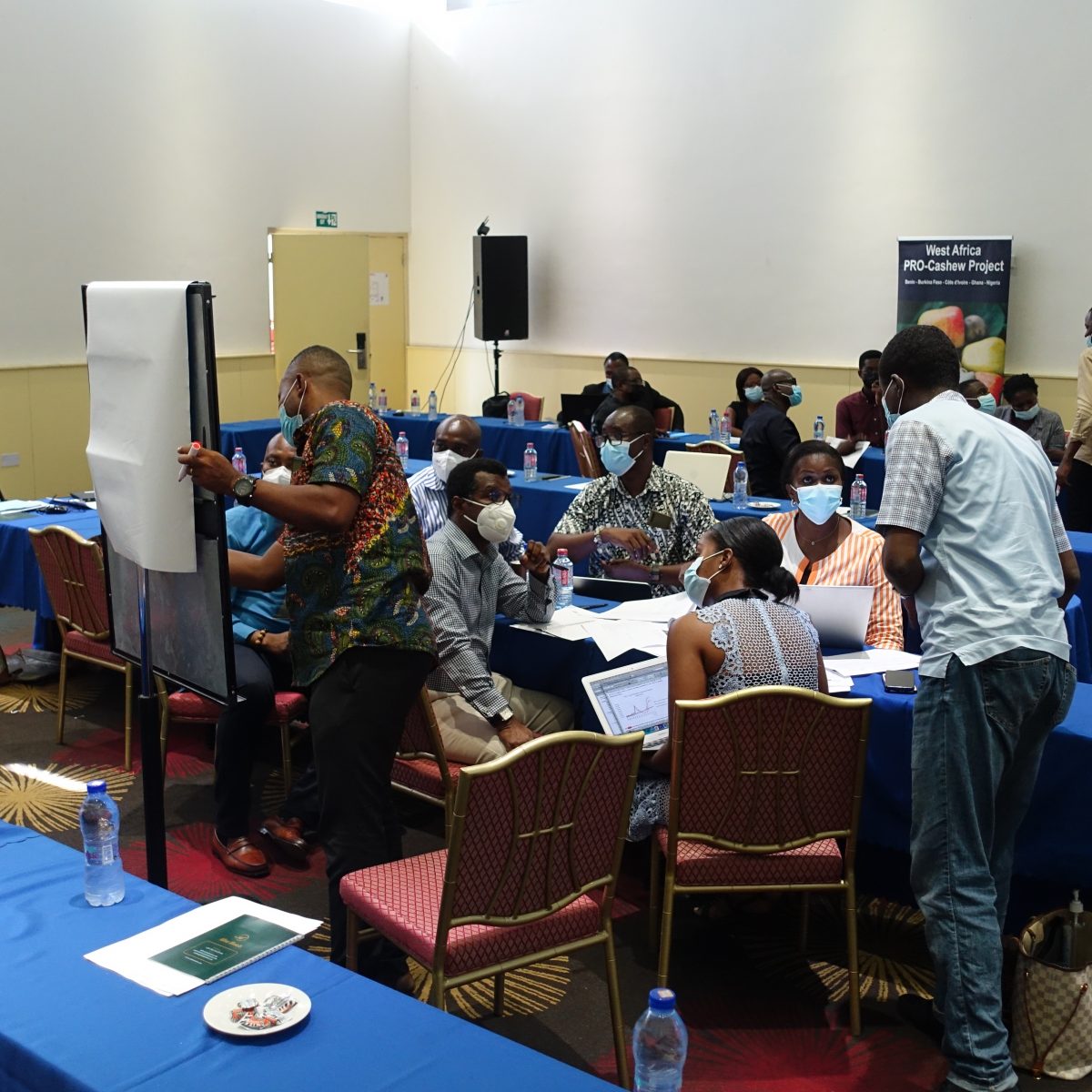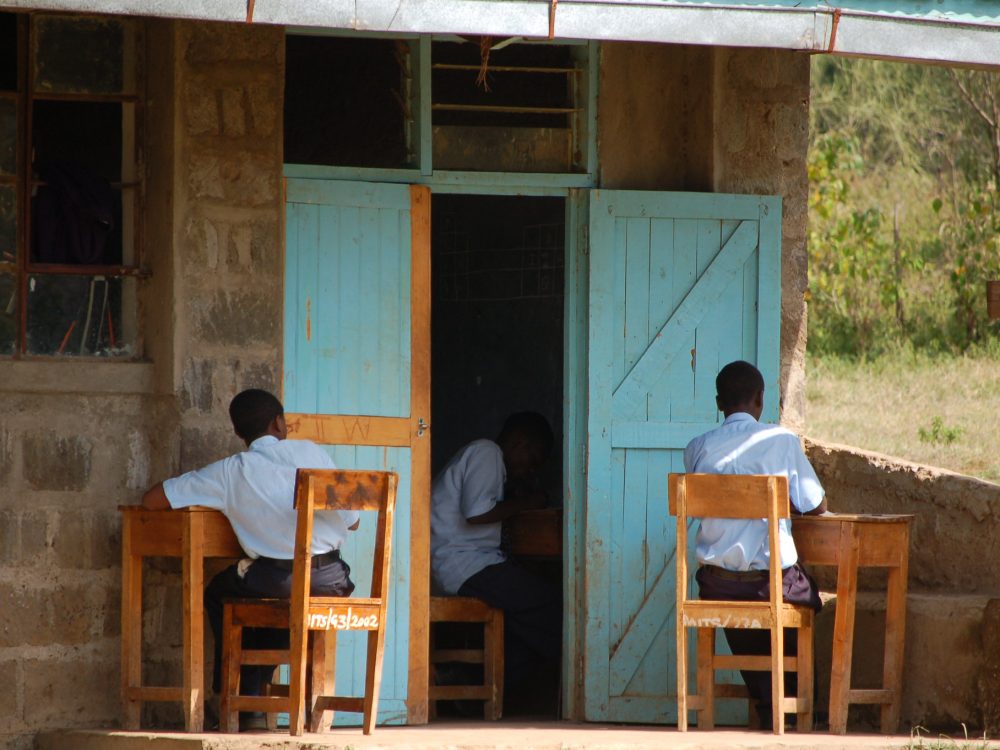
The Cashew-IN Platform: A Deep Dive on Designing to Meet Stakeholder Needs (Part 1)
Comprehensive and reliable data is required in order for cashew farmers, producers, processors, and other stakeholders in the West African cashew sector to increase profits, reduce loss, and improve global competitiveness. Development Gateway: An IREX Venture (DG) has partnered with Cultivating New Frontiers in Agriculture (CNFA) under the USDA West Africa PRO-Cashew project to develop the Cashew-IN program in order to address this need.
The Cashew-IN program, which started in 2020, conducted a landscape assessment of the data in the cashew sectors of five countries: Côte d’Ivoire, Benin, Burkina Faso, Ghana, and Nigeria (referred to as the Cashew-IN countries below). The assessment findings will inform the Cashew-IN platform, a multi-country cashew data management system that the program is developing to facilitate use of data in order to improve decision-making for policymakers, farmers, and the private sector. In this blog (part 1 of 2), we explore the assessment process, findings, and how stakeholders plan to use the platform.
Starting the Cashew-IN Program: the CALM Assessment
The Cashew-IN program first identified gaps in the collection, storage, usage, and dissemination of cashew data. Currently, the program is addressing these gaps by developing the Cashew-IN platform. The ultimate goal is to generate better market outcomes for cashew nuts in the Cashew-IN countries.
At the commencement of the program activities, DG conducted the Custom Assessment Landscape Methodology (CALM) assessment that included:
- A desk review of existing documentation on the cashew sector in West Africa and in program implementing countries;
- A web-based survey of cashew producers, government agencies, development partners, civil society, and private sector actors that highlighted the main challenges in the cashew sector, including access to credit, processing, and access to reliable information and technology; and
- Targeted key informant interviews (KIIs) to dive deeper into the decision-making processes and data priorities of individual stakeholders.
These mixed methods aimed to better understand the cashew value chain challenges and identify the information needs of farmers, policymakers, and the private sector. Overall, the findings show that stakeholders understand the importance of reliable data in the cashew sector and are able to define the types of data and information that could be useful for their activities.
Identifying Needs: The State of the Cashew Data Ecosystem
The CALM assessment found that the Cashew-IN countries collect data according to their needs and capacity, and the majority of survey respondents expressed similar data needs across countries. These macro-level findings and needs that were identified through the CALM assessment include:
- Accessibility concerns: Data and information is often publicly unavailable, despite having been collected in some countries. For example, while cashew data is collected at the farm level or through farmer associations, data is not published or readily available to stakeholders, except through reports submitted for official use or through paid subscriptions. The use of data is also curtailed because of limited data analysis capabilities;
- Processing level data missing: The processing level of the supply chain is the step that lacks the most data mainly due to its sensitivity with regards to private corporations’ economic interests; and
- Standardize producer data: There is a need to standardize data collection from the producers and facilitate its transmission in order to complement the other data sets that are available throughout the value chain.
Developing the Cashew-IN Platform: Collaborating Closely with National Partners
During and after the CALM assessment was completed, national stakeholders were included and engaged in the assessment and validating its findings. Engaging and empowering national partners is an essential element in DG’s collaborative development approach. Our national partners provided key insights throughout this process, including through their commitment to sharing relevant data that will be included on the Cashew-IN platform.
One partner with whom we’ve engaged throughout this process is Roland Oroh, the Director of the Nigeria Agribusiness Register. I (Aminata Camara Badji) discussed the Cashew-IN platform and the state of the cashew sector with Roland in summer 2021. Roland discussed how he envisioned using the Cashew-IN platform and what kind of decisions he could make using the data on the platform. Check out our conversation below and stay tuned for more about the Cashew-IN program and platform!
Share
Recent Posts

Beyond Kigali: Where Does Africa Go from Here with AI?
As governments, funders, entrepreneurs, and technology leaders rally around the AI moment and move towards actions, at Development Gateway, we are asking a different set of questions: Where is the data, and what is the quality of the data behind the algorithms? How will legacy government systems feed AI tools with fresh and usable data? Are Government ministries resourced to govern and trust the AI tools that they are being encouraged to adopt?

Shared Struggles, Shared Solutions: Education and Cross-Sector Data Use Insights
This blog draws on DG’s experience in climate, health, aid management, and agriculture to explore connections between the challenges of data collection, data hosting, and data governance across different sectors and what the solutions to overcoming them can teach us about strengthening education data systems.

Economic Toll of Tobacco-Related Diseases in Kenya: New Research Findings
Development Gateway: An IREX Venture (DG) is pleased to announce the publication of a research manuscript on the Economic Costs of Tobacco-Related Illnesses in Kenya. This research was carried out as part of the Tobacco Control Data Initiative (TCDI) activities in Kenya and is part of a broader report on Morbidity and Mortality from Tobacco Use in Kenya.
